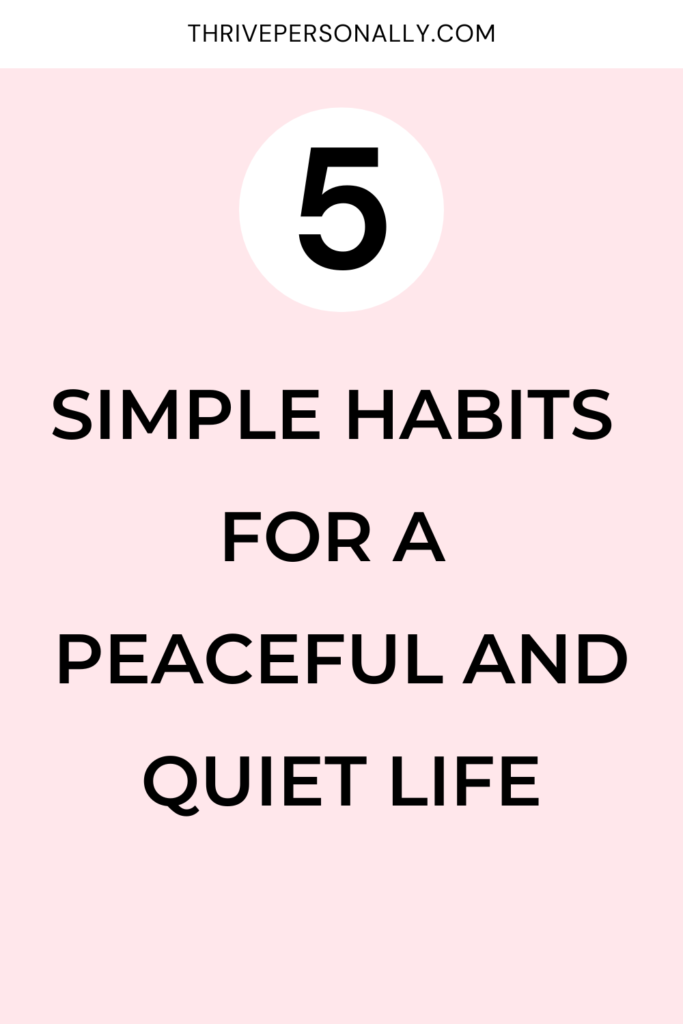Peacefulness can be described as tranquility. When you live a peaceful life, you are stress-free, anxiety-free, and undistracted. At peace means you allow calmness to take over your life and live each day interacting with the world peacefully.
Living a peaceful and quiet life is allowing your mind to be at peace. It’s about finding that happiness in simplicity and not overcomplicating things. Here are 5 simple habits that you can adjust to your life to allow peace to thrive in your life.
Remaining calm and at peace is more important than most people think. We live in a world where everything is go, go, go. Whether it’s working, being on your phone, or planning your next move, you need to slow your life down sometimes.
Learning how to be at peace can allow you to take a step back from the world and focus on yourself. You will start to see how living at peace can affect your day-to-day life. You will have better relationships with others, make smarter decisions, and your body will feel better.
Living A Peaceful and Quiet Life
1. Conscious Breathing
One of the best ways to keep your body at peace is by breathing. Taking even just 2–3 minutes out of your day to clear your head and breathe can make a huge difference. When you’re breathing, you allow your mind to wander and clear your head, like closing your eyes for a minute.
To start practicing this habit, find a quiet spot and sit down with no distractions. Close your eyes and take a deep breath in through your nose while counting to four. Once you hit four, let your stomach expand and release the air out of your mouth while counting to four again.
Once you finish the count of four, relax your body and breathe back in. Repeat this process. This allows your brain to focus on your breathing, which will lead you to a calm state of mind.
You can adjust this habit to your liking. If you don’t want to count, maybe try doing this breathing exercise for five minutes. You can do this when you wake up or before you go to sleep. You can also do this while you’re taking a break from work. The more you practice your breathing, the more you will notice your thoughts.
Read Also: 5 Healthy Changes You Should Start Right Away
2. Declutter
When was the last time you cleaned your room or organized your desk at work? Clutter can be very distracting, and when your surroundings aren’t clean, you can’t think. When you declutter, you allow your mind to feel relaxed and clear.
Did you know decluttering can actually help you think clearer? When your space is clean and organized, you will feel a sense of relief, which will reduce your stress.
Reducing stress will allow you to feel clear-minded, which will improve your thought process. You can start this habit by decluttering at home or at work.
Read Also: Want a Tidy Home? Here Are 10 Smart Decluttering Tips
3. Be Grateful
If you want to live a peaceful and quiet life, you need to practice gratefulness. Gratefulness is a great habit to practice because it allows you to clear your mind and be happy with what you have.
Start by writing down 3–5 things you’re grateful for every day. It can be as simple as grateful for coffee in the morning or I’m grateful for this warm sunshine. By writing things you’re grateful for, you are training your mind to think positive and not let negative thoughts flood your mind.
You can always share your grateful thoughts with friends or family. Start a grateful conversation with someone you love. You can try doing this daily to help keep you and your loved ones grateful.
Read also: 30 Sweet Compliments to Brighten Her Day
4. Exercise Daily

Exercising is another one of the simple habits you should practice daily. When you work out, you release happy hormones, which will make you feel happier and more relaxed.
Did you know that moving your body can help with your mental health? It’s true—when you exercise, you allow your body to feel at peace. You should try and get even just 10 minutes of movement into your day.
You don’t have to go to the gym and lift weights. Take a walk around your neighborhood or stretch at home. You’ll feel accomplished after you exercise, and that feeling will carry on throughout the day.
Another benefit of working out is you will be more likely to sleep better at night. You should also try and be mindful when you’re working out. Pay attention to your body and how it feels as you work out.
Taking time out of your day to work out shows yourself that you care about your mental health.
5. Nature
Lastly, you should make it a habit to be more aware of nature. With our busy lives, it’s hard to find time to relax, but when you take the time to appreciate nature, you will feel at peace.
You should try going on daily walks, whether it’s to a local park or around your neighborhood. Studies have shown that being around animals and trees can help you feel less stressed.
If you’re more of a person that likes to stay home, try gardening. You can start by planting flowers or growing your own food at home. Gardening is a great way for you to feel connected to nature at home.
Plant some colorful flowers or herbs in your kitchen. You could even fill up a window box with flowers. Flowers are a great way to bring nature inside your home and allow you to feel calm.
How To Add These Habits Into Your Busy Schedule
Creating a schedule and sticking to it is the best way to help you add these five simple habits into your life. When you start your day with a schedule, you are more likely to follow through with your plans. Write down the times you want to practice these habits.
Whether it be meditation, journaling, or showing gratefulness, write it down. Once you plan everything out for the day, you give yourself more room to succeed.
You should try starting small when creating your schedule. For example, if you want to meditate for 20 minutes a day, start by only meditating for 5 minutes. As you feel more comfortable, you can start to increase your time.
Pair your habits with something you normally do during the day. You could practice your gratefulness while drinking your coffee in the morning. Allow yourself two minutes to think about things you’re grateful for while you’re drinking your coffee.
Pairing your habits with something you love will help you not forget to do them. You could even try adding these habits with your family members. Spend some quality time with your kids by doing these practices with them.
You want to make these habits adaptable, as life can get crazy some days you might not be able to follow your schedule. If you’re short on time that day, pick the best habit that you can perform that day.
Keep a journal and write down your experiences with these habits. Over time, these 5 simple habits will start to align with your lifestyle.
Save the pin for later



